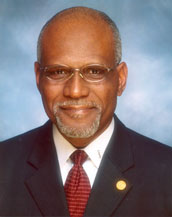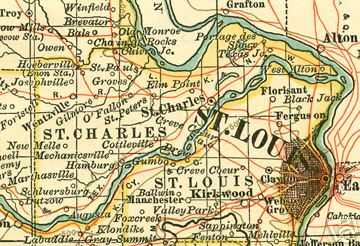Saint Louis, MO — Depending on whom you ask, the latest series of jabs between The St. Louis Post-Dispatch and St. Louis County Executive Charlie Dooley have very different meanings.
Last week, the area’s leading newspaper endorsed Dooley’s Democratic primary challenger, County Councilmember Steve Stenger. The Post-Dispatch has, on three previous occasions, endorsed Dooley. While the endorsement states that Stenger’s new leadership is the best thing for the region, it primarily makes its point by pointing out a number of scandals that have plagued the Dooley administration.
A cartoon accompanied the endorsement. It was the artwork that triggered a firey, lengthy rebuttal from the Dooley campaign.
The cartoon features a smiling Dooley at his desk. Below his nameplate the phrase “The Buck Stops Here” is predominantly featured with the word “here” clearly painted out by Dooley’s caricature.

“We are outraged and embarrassed,” wrote Dooley spokesperson Linda Goldstein. “The cartoon essentially refers to the sitting African-American County Executive (he is still that) as ‘Buck.” For those who don’t know, the ‘Uncle Buck’ characterization goes back to a time of minstrel shows when black men were portrayed as ‘Buck’—a character, often menacing, who couldn’t be trusted. The Post-Dispatch should know that such portrayals do not exist in either historical vacuum or outside the context of the tone of its ow3n coverage of this race.”
For some, like Sen. Maria Chappelle-Nadal, the cartoon confirmed a longheld complaint. For others, like Post-Dispatch Editorial Page Editor Tony Messenger, the fray is just a confirmation that politics sometimes trumps decency.
“’The buck stops here” is the single, most famous phrase in Missouri political history, used by former President Harry S Truman, who, by the way, integrated the armed forces,” Messenger told The Missouri Times in an email. “It is a simple measure of accountability, the ability of a leader to take responsibility for the actions of his or her administration. That’s it, and that was the exact context in which it was used.”
Messenger, along with some members of the Stenger camp, say Dooley’s outrage is far from genuine. More than likely, they say, it’s a ploy to gin up black turnout in what is likely to be a low turnout primary date. With a large chunk of Dooley’s support coming from within the county’s black community, painting Stenger and his supporters as racists may be an effective ploy.

Messenger said he was “offended” that he or the editorial board would be accused of racial motivations. Chappelle-Nadal, a black woman, says she’s seen bias before on the editorial page. Chappelle-Nadal has been a target of the paper in recent months, at times for her vocal support of private school options for transfer students.
“The writers at the Post-Dispatch have been very fair and I want to be clear about that,” Chappelle-Nadal said. “But with respect to the editorial board, specifically, I think they have some prejudice. Some say it’s racial, some say it’s a sexist thing. I feel the editorial board staff has some bias because of their relationships with people who happen to be white.”
Messenger, however, says it’s those exploiting racial divides that deserve our ire.
“I’m saddened that some political consultants believed that creating an intentional racial divide as part of a political campaign was a good idea,” Messenger said.
Collin Reischman was the Managing Editor for The Missouri Times, and a graduate of Webster University with a Bachelor of Arts in Journalism.



